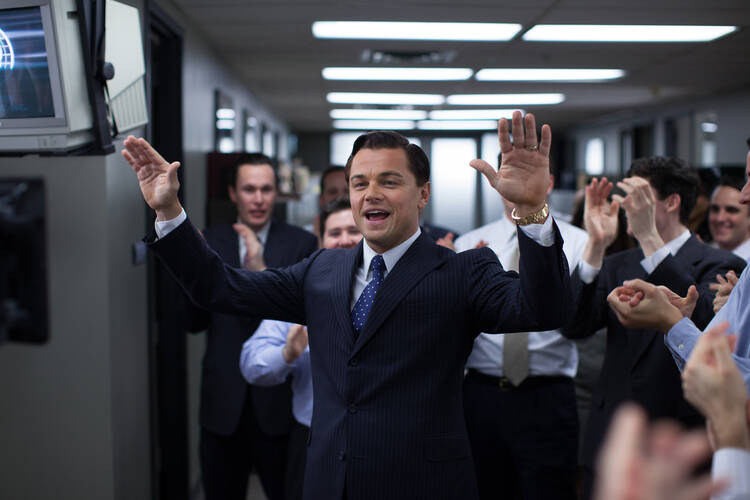I recently forced myself to see Martin Scorsese’s new film, The Wolf of Wall Street. It’s strange to describe going to a Scorsese movie as something I had to talk myself into; often the trailers alone grab me by the throat and won’t let go until I see the thing. But hearing star Leonardo DiCaprio describe the film as a latter day Caligula gave me pause. I can take three hours of a lot of things, but I wasn’t really sure what the point of that particular exercise might be.
Neither were a lot of critics. Chris Nashawaty wrote in Entertainment Weekly that “the feverishly paced film is hell-bent on making the audience feel like they just snorted a Belushian mountain of blow.” (1/15/14) Others have noted how little attention is given to the real life victims of the scams DiCaprio’s character Jordan Belfort perpetrated. After a screening at the Academy of Motion Picture Arts and Sciences one Oscar voter went so far as to yell “Shame.”
Having seen the film, I can confirm, it truly is a three-hour ride into eager and enthusiastic debauchery. Unlike Oliver Stone’s 1987 “Wall Street,” and so many other films of our oh-so-American “crazy, god-complex narcissist” genre, Wolf doesn’t end with “the lesson,” the moral of the story. In the end, Belfort does indeed lose pretty much everything, but he’s still got a room full of strangers hanging on his every word. Two crowds, in fact: the one onscreen, and we the audience.
But to read the film as a glorification of greed seems to me a gross misunderstanding. It is true, Belfort and his pals spend much of the film having a fantastic (and often hilarious) time. I’m not sure that DiCaprio has ever been funny like he is here; he shows a talent for physical comedy in particular that is nigh irresistible.
He is also at his absolutely most charismatic—which for DiCaprio already is a very high bar. He gives ferverinos to his traders as powerful as anything you’ll see in a Leni Riefenstahl film, and seduces us as well, with charming asides spoken directly to the camera.
Even as things go south—and when you have snorted as much coke as Belfort and company do, how could they not?—it’s clear Belfort is having the time of his life.
But the sheer repetition of the drug use and the orgies and the sheer bravado of DiCaprio’s performance does add up, for us if not for him. In a strange way the whole thing is not dissimilar from the exhausting destruction of Metropolis in the last half hour (or was it eternity?) of this summer’s “Man of Steel.” Except, rather than pummel you into oblivion, Scorsese works like a consummate chef boiling his frogs. He turns up the heat little by little until at the end we realize how sick we feel.
Or should feel, anyway. Some reports suggest traders on Wall Street are watching the film as a sort of gleeful celebration of the life they want. I’m sure they’re not alone. But I think that, too, is part of Scorsese’s point. Tell me what you will about how you live your life, the charities you support, the moral compass you follow—that ferocious, never-sated hunger for excitement and the new and “More! Now! More!” has hooks in all of us. And what separates us from Belfort may be as much a matter of opportunity as moral fiber. Even the “hero” of the story, Kyle Chandler’s F.B.I. agent Denham, can’t help but wonder at the end whether he made the right choice in refusing DiCaprio’s staggering bribe.
Speaking of Chandler, one thing “Wolf” does glorify is great writing and great acting. In a single script, Terence Winter has produced not one but multiple scenes better than any in recent memory, including one between DiCaprio and Chandler that makes you wish the Academy gave out an award for best scene. Likewise the resurgent Matthew McConaughey has a monologue that all by itself probably merited a second Oscar nod.
Jonah Hill as Donnie, Belfort’s partner in crime; Jon Berenthal as Belfort’s money laundering drug dealer Brad; Rob Reiner as Belfort’s father; Jean Dujardin, Jon Favreau, Cristin Milotti, Margot Robbie and quite a few unknowns put on an amazing display of talent.
Much as been made over the course of his life about Scorsese’s Catholic roots and undeniable use of religious imagery. This summer he is slated to shoot an adaptation of “Silence,” the 1966 Shusaku Endo story about the Jesuits and companions martyred in 17th century Japan. In 1988 he did an adaptation of Nico Kazantzakis’ “The Last Temptation of Christ.” If “Last Temptation” served as Scorsese’s meditation on the life of Jesus, “The Wolf of Wall Street” serves as the opposite bookend, his meditation on Hell. And like “Last Temptation,” it’s both important and controversial because it takes temptation seriously. What did we expect the devil to look like, a guy with a cape, twirly mustache and tail? Michael Douglas peddling greed? Real temptation is a lot more attractive; it hides its victims and its consequence, and for a long time it’s usually a lot more fun.








